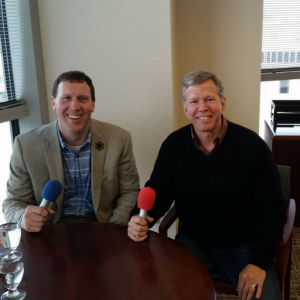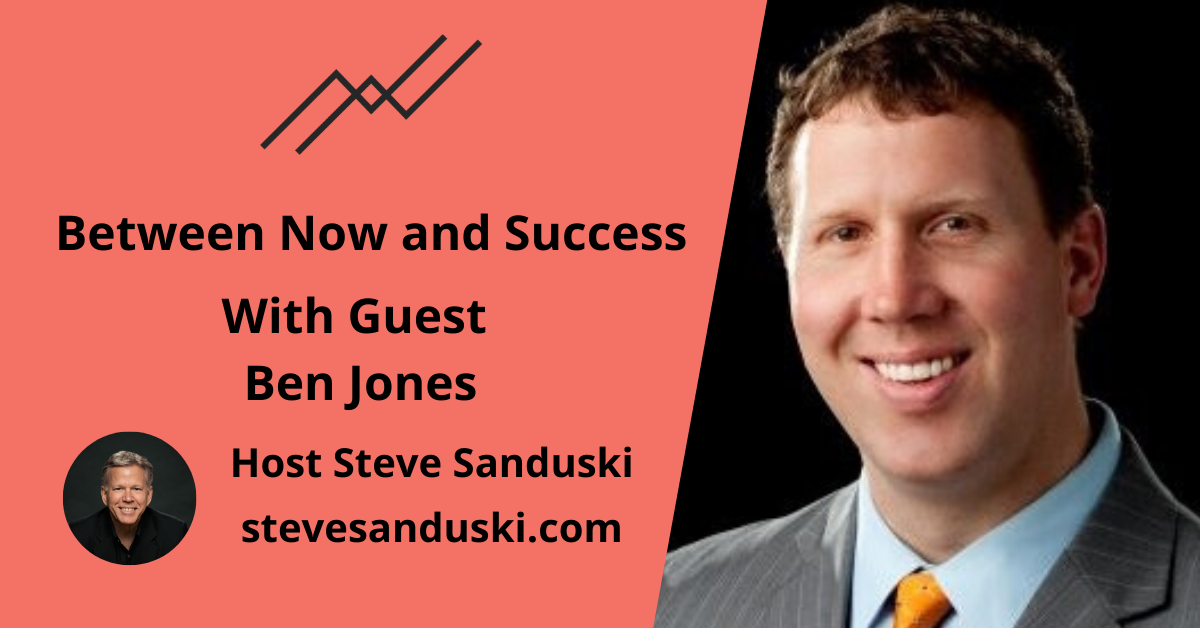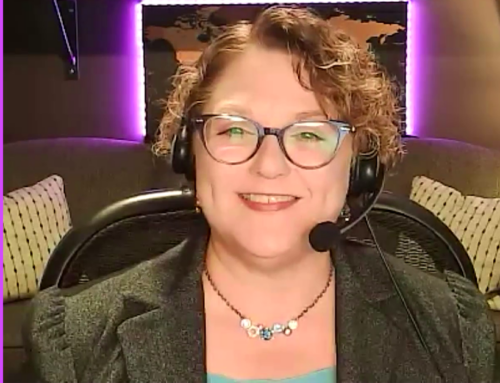Once upon a time, financial planners met with clients annually, showed them a printout of how all their investments were performing, shook hands, and moved on to the next annual appointment with the next client.
Smart advisors know those days are over. Many investors are already monitoring their portfolio online, often for free. Fees are compressing across the financial advisory industry. A younger, more connected, generation is starting to decide how much money, and how much spare time, they want to invest in planning for their futures.
On today’s show, I talk with Ben Jones, Managing Director of Intermediary Distribution for BMO Global Asset Management and host of BMO’s excellent Better Conversations Podcast. Here are some highlights from our conversation about how financial advisors can engage in better conversations that lead to better outcomes for your clients.

Ben Jones and Steve Sanduski after completing the podcast recording.
1. Value beyond the numbers
Health, lifestyle, emotional well-being — these topics make some financial advisors uncomfortable. But as apps and online tools continue to advance, advisors who only focus on investment management are going to become obsolete. Clients want something from an advisor that they can’t download by themselves, for free. The modern advisor-client relationship is going to exist at that messy place where money and life intersect. Advisors who can put investments and retirement planning in a more emotional context — happiness, fulfillment, a legacy for your children — will be offering their clients perspective that a robo advisor cannot.
To continue reading, please enter your email address to unlock the content.
2. Embracing technology
Ben believes that “Anything that can be put into an algorithm will be.” This can have negative consequences and lead to fee compression. But technology can also free advisors to expand their services and the scope of their conversations with clients.
Advisors who embrace automation for some tasks can use that freed time to focus on improving interpersonal skills. Work on understanding who your clients are as people, empathizing with their challenges as well as their financial dreams. With that fuller picture of the client, advisors can think about financial planning as a problem solving tool: If my client has two college-bound teenagers, what plan can we put in place to make those big tuition payments easier?
Once an advisor has connected with clients on this personal level, technology makes it easier to tend to that relationship outside of regular in-office meetings. Emailing relevant financial articles, sending annotated reports, the occasional Skype check-in call — these are all positive developments for financial advisors who use tech to enhance their services. Advisors also might find that they’re able to take on more clients than they could before by automating tasks that don’t require that personal touch.
There’s some danger here too — a Skype call is no substitute for a face-to-face when the topic is delicate — and financial advisors will have to find balance in order to serve their clients needs for financial planning, and generate new business.
3. People matter
Financial advisors work in human capital. Just as it’s important to see your clients as people and not just spreadsheets, it’s important to see your employees and co-workers as people too.
As the leader of his office, Ben takes special care to make sure he’s interacting with his team beyond just what they’re contributing to the company. “Management by walking around” isn’t a new idea, but it keeps the leader engaged with the team. Little conversations around the office go a long way towards keeping everyone motivated and happy. These conversations also might give the leader new insights into office operations that work well, and other tasks that might be established but unnecessary. Again, the key is focusing on people, not processes.
Likewise, Ben doesn’t believe in managing from a pedestal. He wouldn’t ask anyone working for him to do something he himself would not do. This point might become particularly relevant as automation forces financial advisors to reframe financial planning as life planning.
Change often comes from the top down. If employees see the boss working to connect with clients and discuss their finances in an emotional way, that example will ripple through the office and improve the planning experience for both clients and advisors.
Resources
Better Conversation, Better Outcomes podcast by BMO Global Asset Management
Power Score: Your Formula for Leadership Success by Geoff Smart and Randy Street
Rhinoceros Success : the Secret to Charging Full Speed Toward Every Opportunity by Scott Alexander
Drive: The Surprising Truth About What Motivates Us by Daniel H. Pink
TouchPoints: Creating Powerful Leadership Connections in the Smallest of Moments by Douglas Conant, Mette Norgaard
Values Clarification Toolkit Click here to download this FREE tool and start living your values.





